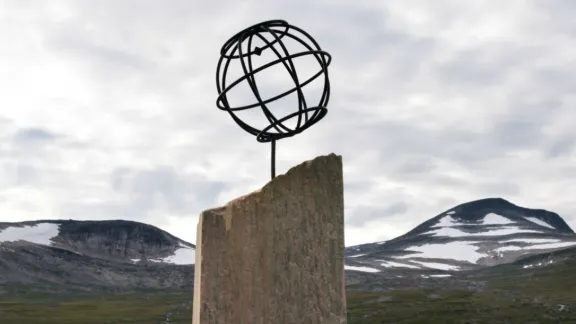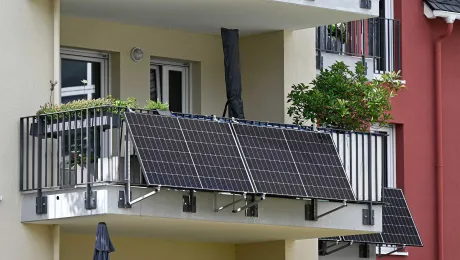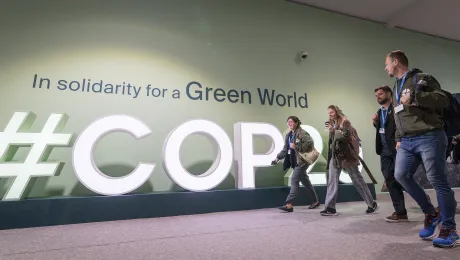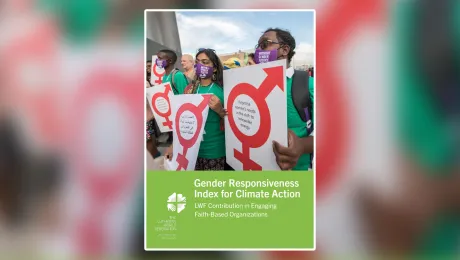
A monument marks the Arctic Circle in Saltfjellet, Norway. Snow previously covered these mountaintops all year round. Photo: Ryan Rodrick Beiler
OSLO, Norway/GENEVA, 23 November 2015 (LWI) - Later this month, a landmark United Nations (UN) summit on climate change, in short COP21, begins in Paris, France. As the world’s political leaders come together to set environmental policy, church leaders from all continents are among the wide range of grassroots voices converging in the French capital to call for climate justice.
Lutheran World Information spoke with young church representatives from Norway about their concerns for climate justice, including their journey to Paris on a “Climate Train.”
“This [COP 21] conference is a milestone for a new comprehensive climate agreement for all countries,” says Per Ivar Våje, project coordinator for Creation and Sustainability for Church of Norway, Norwegian Church Aid and the Christian Council of Norway. “Church leaders, together with other religious leaders can add pressure on politicians by speaking out with a moral voice and on behalf of millions of members.”
Våje is leading a group of youth church leaders riding on the special “Climate Train” from Norway early December, and for whom the journey to Paris is just as important as the destination. Trains produce far fewer emissions than air travel. So while this trip will take longer than a flight, it’s a potent public witness of how care for the creation requires real changes in people’s lives.
“In the Bible, God gives us the responsibility to take care of the earth,” says Karen Melhus, 20, of Kristiansand, Norway. “That can be done in a lot of different ways, but people can and must do something in their daily lives.”
Melhus is in her second year of theological studies at the Norwegian School of Theology in Oslo. She is one of two Church of Norway youth representatives who will take part in activities planned around the Conference of the Parties (COP) to the 21st session of the United Nations Framework Convention on Climate Change, 26 November -12 December. She learned about climate change through discussions at the church’s annual youth synod.
Record high temperatures
Preparations for COP 21 involved meetings with other Norwegian church leaders and environmental groups, as well as discussions with the Minister of Climate and the Environment Tine Sundtoft.
According to government meteorologist Kjersti Opstad Strand, Norway had its warmest winter on record in 2014, with some researchers blaming shifting weather patterns on a decrease in Arctic snow. That ended a year of record high temperatures that averaged 2.23 degrees above normal. This was accompanied by extreme weather phenomena including droughts, wildfires, and floods.
According to government estimates, the annual mean temperature could rise by 2.3 to 4.6 degrees by the end of this century. In the same period, the sea level along the Norwegian coast is expected to rise between 50–100 centimeters along the southern and western coasts.
Indigenous people’s livelihoods
For the Sámi indigenous people of northern Norway, climate change is not a future question but a present reality. Linnea Fjellheim Varsi, 18, and Hilje Kristoffer Jåma, 19, will represent the Sámi Church Council in Paris.
Fishing and reindeer husbandry are particularly important to the Sámi. But in just one example of how climate change is already affecting their lives, rising temperatures have caused thawing and re-freezing cycles that prevent reindeer herds from foraging beneath hardened layers of ice and snow.
“The Sámi and Norwegians see the same problems and challenges,” says Jåma. “But the Sámi people have always been a natural people and the consequences will be bigger for us.”
A sustainable climate policy
The young leaders are confident that the church’s voice is vital to the climate conversation. Fellow delegate Victoria Tobiassen, 18, from Bodø, says young people have a unique sense of urgency in inspiring the church. They are afraid about what the future holds for them and “it is easier for them to take part in climate activities,” she adds.
“It could be interesting to see how people react to us going on behalf of the church. It could be fun but also a bit scary because there are some who are skeptical of the church’s environmental engagement and its interests in politics,” Melhus says.
On what to expect out of the COP21 talks, the young leaders speak of their conviction that real change will only happen when enough people take action.
“My biggest wish is that we can create a sustainable climate policy,” says Jåma. “It has to happen now, because the world is moving towards a breaking point. Both the state and the church have to put a greater focus on climate and environmental policy,” he adds.
(By LWI correspondent Ryan Rodrick Beiler)


